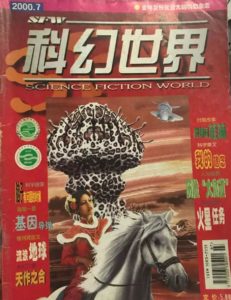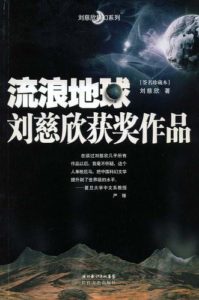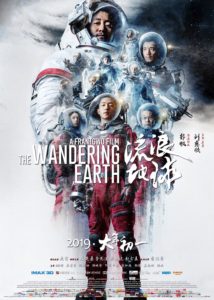The Wandering Earth
流浪地球
China, 2019, colour, 2.35:1, 3-D, 125 mins. (release version), 137 mins. (special edition).
Director: Guo Fan 郭帆.
Rating: 7/10.
Big-budget sci-fi disaster movie is entertaining enough without bringing anything new to the table.
Beijing No. 3 Underground City, the second half of the 21st century, just before Chinese New Year. Thirty years ago, following increasingly extreme weather and rising sea levels, scientists had confirmed the Sun was rapidly degenerating and expanding, and would engulf the Earth in 100 years. In 300 years’ time the solar system would cease to exist. A United Earth Government, based in Washington, was set up which decided on a scheme – called the Wandering Earth Project – to propel the planet out of the solar system on a 2,500-year migration to a new home 4.2 light years away. The Earth’s rotation would be stopped by Torque Engines along the Equator and then the planet would be powered out of orbit by 10,000 Earth Engines. Beneath each Earth Engine, underground cities were constructed as temperatures plummeted and an international space station, Navigator, built to guide Earth on its trajectory. Among the astronauts who joined Navigator was China’s Liu Peiqiang (Wu Jing), a widower who left behind his father Han Zi’ang (Wu Mengda) and four-year-old son Liu Qi (Guo Hexuan). Now, 17 years later, as Earth nears the gravitational field of Jupiter that it is to use to exit the solar system, Liu Peiqiang is due to come home after his tour of duty. Now 21, Liu Qi (Qu Chuxiao), a trainee mechanic, steals his grandfather’s ID card, buys two thermal suits from a black marketeer (Lei Jiayin) and, with junior high-schooler Han Duoduo (Zhao Jinmai), goes AWOL on to the surface, where the temperature is -84C. Stealing the giant transporter that his grandfather drives, Liu Qi takes Han Duoduo on a joyride through the snowy wastes to celebrate Chinese New Year. After being arrested by police they’re jailed in Jining N3 Supply Depot, Shandong province, where they get to know Tim (Sui Kai), a Chinese-Australian in the next cell. Han Zi’ang comes to collect them but is himself jailed for trying to bribe the security guard (Gong Ge’er). As Earth nears Jupiter, it is slightly off course to engage properly with the latter’s gravitational field. Massive earthquakes hit Earth as its Asian plates are affected, and 4,771 Earth Engines shut down. Liu Qi, Han Duoduo, Han Zi’ang and Tim escape in the chaos and head back to Beijing in Han Zi’ang’s transporter. En route, however, it’s requisitioned by an elite squad, led by Wang Lei (Li Guangjie), that has been ordered by the United Earth Government to deliver “lighter core” 火石 to re-start the Hangzhou Earth Engine. Unless all the damaged Earth Engines are re-started, the planet will collide with Jupiter, dragged down by its massive gravity. When the convoy reaches Shanghai, the city is an unrecognisable collection of frozen skyscrapers and ice canyons. As Earth’s Asian plates start to shatter, the convoy is buried by an avalanche. Taking shelter in a skyscraper, they almost lose the “lighter core” in a lift shaft, and experience the first of several casualties. Meanwhile, on Navigator, Liu Peiqiang has managed to break out of the hibernator he was ordered to lie in and, with Russian colleague Makarov (Arkadi Sharogradsky), tries to prevent the space station and Earth plummeting into Jupiter. However, the onboard computer MOSS has been programmed to stop them.
REVIEW
Chinese cinema joins the outer-space race with The Wandering Earth 流浪地球, a big-budget sci-fi disaster movie in which Earth’s odyssey to find a friendlier solar system is threatened by Jupiter’s gravitational pull. Entertaining enough, despite an almost complete lack of originality, and solidly put together by Guo Fan 郭帆, a director with only two films to his name, it’s proved the clear box-office winner for CNY 2019 with a giant RMB4.6 billion, safely ahead of competitors like Crazy Alien 疯狂的外星人 (RMB2.2 billion) and Pegasus 飞驰人生 (RMB1.7 billion) and only a billion or so below the Mainland’s all-time champion Wolf Warrior II 战狼II (2017), also starring Wu Jing 吴京. More importantly, it seems to herald a year when Chinese cinema joins the major sci-fi league, with films like Pathfinder 拓星者 (astronauts stranded on a planet, dir. Zhang Xiaobei 张小北) and the humans-vs-aliens Shanghai Fortress 上海堡垒 (Teng Huatao 滕华涛) and Warriors of Future 明日战机 (Hong Kong’s Wu Xuanhui 吴炫辉) waiting in the wings.
Wandering Earth is a long way from being China’s first sci-fi film. Though the genre, like detective fiction, is nowhere near as deeply embedded in the country’s literature as in the West – a gap filled by the martial-arts genre and costume fantasies like Journey to the West – Chinese sci-fi movies have been around since the 1980s, with isolated instances even going back to the 1930s. Sci-fi/techno/futuristic thrillers have been a regular genre since the 1990s. It’s more accurate to say that Earth is China’s first big-budget space movie on a par with western ones, with occasional earlier examples like cheesy kidpic Space Rescue 太空营救 (2001, with all the aliens played by westerners) and the classy-looking The Space Dream 飞天 (2011, largely a training film set on Earth) paving the way.
 Earth is based on a modest but imaginative short story by the Mainland’s best-known sci-fi writer, Liu Cixin 刘慈欣 – The Roaming Earth 流浪地球, first published in the Jul 2000 edition of Science Fiction World 科幻世界, the Mainland’s long-running and only sci-fi magazine (see cover, left). It first appeared in book form in a Nov 2008 collection of Liu’s prize-winning short stories that also included the one that inspired Crazy Alien (see cover, below left). The film’s connection with the original story is closer than that to Alien but is still rather slim. The backstory of Earth being dislodged from its orbit to ensure human survival as the Sun dies is pretty much as in the short story; but the film’s main event of trying escape Jupiter’s massive gravitational pull is pure
Earth is based on a modest but imaginative short story by the Mainland’s best-known sci-fi writer, Liu Cixin 刘慈欣 – The Roaming Earth 流浪地球, first published in the Jul 2000 edition of Science Fiction World 科幻世界, the Mainland’s long-running and only sci-fi magazine (see cover, left). It first appeared in book form in a Nov 2008 collection of Liu’s prize-winning short stories that also included the one that inspired Crazy Alien (see cover, below left). The film’s connection with the original story is closer than that to Alien but is still rather slim. The backstory of Earth being dislodged from its orbit to ensure human survival as the Sun dies is pretty much as in the short story; but the film’s main event of trying escape Jupiter’s massive gravitational pull is pure  invention by the film-makers. The script, by eight writers and with Liu credited as creative producer 监制, trades on established space-movie situations (astronauts vs a pesky computer, Earth ruled by a single government) and futuristic landscapes (Earth in an Ice Age with humans in subterranean cities), but it shuffles the cliches around in a lively way, with the accent on humans rather than technology and good old elbow grease deciding Man’s fate.
invention by the film-makers. The script, by eight writers and with Liu credited as creative producer 监制, trades on established space-movie situations (astronauts vs a pesky computer, Earth ruled by a single government) and futuristic landscapes (Earth in an Ice Age with humans in subterranean cities), but it shuffles the cliches around in a lively way, with the accent on humans rather than technology and good old elbow grease deciding Man’s fate.
A former power-plant engineer, Liu, 55, started to develop a reputation in the 1990s and definitively made his name in the 2000s, notably with The Three-Body Problem 三体 (serialised in Science Fiction World in 2006), the opener in his trilogy Remembrance of Earth’s Past 地球往事. (The film version of Three-Body, directed by Zhang Panpan 张番番 and starring Feng Shaofeng 冯绍峰 and Zhang Jingchu 张静初, was shot in 2015 but still languishes in post-production.) In 2012 China Film bought the rights to that trilogy as well as other works by Liu and in 2014 decided to go ahead with Earth, with Guo joining the project in 2015 and shooting taking place during 2017 at Qingdao studios. A commercials director, Guo, then 35, had previously co-directed Lee’s Adventure 李献计历险记 (2011), an ambitious but failed attempt at a live-action version of a cult animated short, and solo-directed the far more successful schooldays romance My Old Classmate 同桌的妳 (2014), starring Zhou Dongyu 周冬雨 and Lin Gengxin 林更新.
What Liu’s novels lack in literary style, believable dialogue and fully-drawn characters they make up for in breadth of imagination and scientific detail, even on a hokum level. In short, he’s good at Big Ideas. In that respect, Earth delivers, manufacturing a plot of cosmic size from a slim, basically philosophical short story. After sketching the backstory in a narrated introduction, it focuses on an astronaut (Wu) in the international space station that’s guiding Earth on its 2,500-year odyssey out of the solar system. Just when he’s due to return to Earth after a 17-year tour of duty, the planet accidentally gets caught up in Jupiter’s gravitational pull that was originally meant to catapult it into deep space. As Earth hurtles towards Jupiter, the astronaut’s family on Terra Firma becomes involved in an worldwide attempt to restart the huge terrestrial engines that power Earth on its voyage.
The set-up to the main action is succinctly laid out in the opening half-hour, with the remaining 90 minutes focused on the main event as the clock ticks down to Earth’s collision with Jupiter. But some of the problems that later diminish the film dramatically are already present: criss-crossing between the father on the space station and the son on Earth, and the former’s eventual decision to risk his life to save the latter. Though the personal story is established early on, it’s simply not enough to drive the later drama, especially as there’s no emotional bond between father and son beyond the abstract. (He’s been away 17 years, and his son, who’s only 21, hardly knows him.)
The giveaway is that the film would have worked equally well without the family connection, as it’s basically two movies in one: the action-filled drama on Earth and the story on the space station, where the father has developed a friendship with a Russian astronaut. The former strand is the bigger of the two, with the son joyriding above ground on Chinese New Year before he, his grandpa and a high-school girl (plus a half-Chinese guy for comic relief) are co-opted into the mission of mending the Earth Engines. The latter strand only gets going in the second half, as the father and the Russian take on the space station’s deadly computer to save the human race.
As the father, Mainland action star Wu (who invested RMB60 million when the production ran out of money) has a quiet dignity that’s very different from his action heroes of the Wolf Warrior films but helps to make the closing moments genuinely moving as a portrait of individual heroism. Back on Earth, 24-year-old Qu Chuxiao 屈楚萧 (youth comedy Twenty 二十岁, 2018) is okay as the rebellious son who develops some adult gravitas as the story unfolds but he’s eclipsed in the character stakes by Hong Kong veteran Wu Mengda 吴孟达 [Ng Man-tat] as the feisty grandpa. American-Chinese actor-presenter Sui Kai 隋凯 [Michael Sui], who played the goofy foreign student in Guo’s Classmate, brings some much-needed levity to the film’s more outrageous moments, while 16-year-old Zhao Jinmai 赵今麦 (the heroine’s BFF in youth comedy Go Brother 快把我哥带走, 2018) doesn’t have much to do after the opening section. The members of the terrestrial special-ops group are too numerous to establish individual personalities, especially when wearing helmets most of the time, though as their leader Li Guangjie 李光洁 (the demon police chief in Hanson and the Beast 二代妖精之今生有幸, 2017) is commanding when given the chance.
Visual effects are good and, on Earth, have a suitably pulpy quality that fits the outrageous plot. Action staging, however, is variable – a setpiece in a Shanghai lift shaft is chaotic, with no sense of geography or who’s who – and underscoring is standard wall-of-sound heroic stuff. Editing, supervised by Hong Kong ace Zhang Jiahui 张嘉辉 [Cheung Ka-fai], is as tight and mobile as the typically versatile camerawork by Liu Yin 刘寅 (My Old Classmate; The Insanity 你好,疯子!, 2016). Art direction by Gao Ang 郜昂 is okay in a standard industrial-futuristic way, with subterranean life on Earth not much different from today (high-school lessons, arcades, fast food, computer gaming), though there’s a nice joke as the special-ops convoy passes a snow-covered 2044 Shanghai Olympics stadium.
Among the several cameos by Guo’s friends, Liu himself pops up as a space-station officer. As a footnote, it’s worth noting the refreshing absence of Americans (except in some off-screen voices) from a genre that Hollywood has made its own. Sui plays a Chinese-Australian; the father’s astronaut pal is Russian; and the United Earth Government, though based in Washington, seems to be mostly peopled by French. Vive la diversité.
[On 26 Nov 2020 a Special Edition, also in 3-D and running 12 minutes longer, premiered at the China Film Golden Rooster Awards festival in Xiamen, Fujian province.]
CREDITS
Presented by China Film (CN), Beijing Jingxi Culture & Tourism (CN), Beijing Dengfeng International Media (CN), Frant Gwo Culture Communication (Beijing) (CN).
Script: Gong Ge’er, Yan Dongxu, Guo Fan, Ye Junce, Yang Zhixue, Wu Ti, Ye Ruchang, Shen Jingjing. Photography: Liu Yin. Editing: Zhang Jiahui [Cheung Ka-fai], Ye Ruchang. Music: A Kun, Liu Tao. Art direction: Gao Ang. Styling: Wang Xiyu. Sound: Wang Danrong, Zhu Yanfeng, Liu Xu. Action: Yan Hua. Special effects: Marco Wuest. Visual effects: Ding Yanlai (Base FX).
Cast: Wu Jing (Liu Peiqiang), Qu Chuxiao (Liu Qi/Hukou), Li Guangjie (Wang Lei), Wu Mengda [Ng Man-tat] (Han Zi’ang), Zhao Jinmai (Han Duoduo), Sui Kai [Michael Sui] (Tim), Qu Jingjing (Zhou Qian/Yatou), Zhang Yichi (Li Yiyi), Yang Haoyu (He Lianke), Arkadi Sharogradsky (Makarov), Li Hongchen (Zhang Xiaoqiang), Yang Yi (Yang Jie/Liuzi), Jiang Zhigang (Zhao Zhigang), Zhang Huan (Huang Ming), Lei Jiayin (Yi Ge), Ning Hao (Er Shu), Liu Cixin, Guo Jingfei (space-station officers), Wang Zhi (Han Duoduo, Liu Qi’s mother), Zhang Zixian (Huang Guosheng), Guo Hexuan (young Liu Qi), Lu Yang, Zhang Ning, Zhao Yilong (security officers), Zhang Xiaobei (tram driver), Tao Luoyi (junior high-school teacher), Rao Xiaozhi, Jin Long (space-station engineers), Wu Xiaoliang (squad member), Gong Ge’er (Jining supply-depot jail guard), Guo Fan (forklift driver), Chen Yesheng (Yi Ge’s younger brother), Yu Wenlong (supply-station guard), Wang Yifei (young Han Duoduo).
Release: China, 5 Feb 2019.
